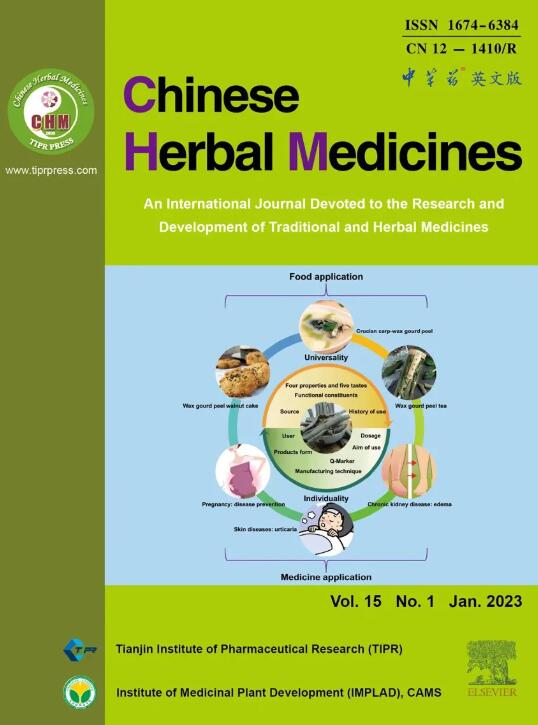舒风解毒颗粒抗轻度COVID-19:随机、双盲、安慰剂对照、多中心heal-COVID III期研究方案
IF 8.9
4区 医学
Q1 CHEMISTRY, MEDICINAL
引用次数: 0
摘要
目的:鉴于欧米克隆可能持续存在,本试验评估疏风解毒颗粒(SFJDG)治疗轻度欧米克隆感染的安全性和有效性,旨在寻找新的治疗方法,特别是针对家庭治疗患者。方法随机、双盲、安慰剂对照、多中心III期临床试验共纳入844例患者,分为治疗组(422例)和对照组(422例)。受试者将服用SFJDG或安慰剂,为期7天(1.2 g/袋,2袋,3次/天)。医院评估将在第1天和第8天进行,电话评估将在第3天和第5天进行。在第10天和第14天继续随访。日记卡将跟踪症状评分和安全数据。主要结果是从2019冠状病毒病(COVID-19)症状持续临床恢复的时间。在70%的患者完成随访后进行中期分析,基于O ' brien - fleming型累积错误花费函数进行中期分析时的I型误差修正(α1 = 0.015)。该III期试验评估了SFJDG治疗轻度COVID-19的有效性和安全性,重点关注了SFJDG在家庭管理患者中的实际适用性。该研究的随机、双盲、安慰剂对照设计确保了方法的严谨性,同时其综合结果测量兼顾了症状恢复和治疗安全性。通过强调症状缓解和恢复时间,该试验符合治疗COVID-19轻症病例的临床重点。这些发现可以为SFJDG在改善患者预后和解决现有抗病毒治疗留下的空白,特别是在症状管理方面的作用提供有价值的见解。结论SARS-CoV-2基因组亚谱系的毒力持续存在,全球风险评估仍然很高。这项III期研究采用稳健的方法来调查SFJDG作为轻度COVID-19治疗方法及其有效性和安全性。此外,本研究旨在为SFJDG特别是家庭治疗患者的市场注册提供充分的科学依据。如果成功,SFJDG可能是对轻度感染的治疗选择的有意义的补充,支持公共卫生战略管理SARS-CoV-2的持续影响。本文章由计算机程序翻译,如有差异,请以英文原文为准。
Shufeng Jiedu Granule against mild COVID-19: Protocol of the randomized, double-blind, placebo-controlled, multi-center heal-COVID phase III study
Objective
Since Omicron will likely persist, this trial evaluates the safety and efficacy of Shufeng Jiedu Granule (SFJDG) for mild Omicron infection, aims at finding new therapies especially for home-treated patients.
Methods
This randomized, double-blind, placebo-controlled, multi-center phase III trial involves 844 patients, divided into a treatment group (422) and control group (422). Participants will receive SFJDG or placebo for 7 d (1.2 g/bag, 2 bags, 3 times/d). Hospital evaluations will be done on days 1 and 8, with telephone assessments on days 3 and 5. Follow-up continues on days 10 and 14. Diary cards will track symptom scores and safety data. The primary outcome is the time to sustained clinical recovery from corona virus disease 2019 (COVID-19) symptoms. An interim analysis will occur after 70 % of patients complete follow-up, with Type I error correction (α1 = 0.015) at interim analysis based on O’Brien-Fleming-type cumulative error spending function.
Results
This phase III trial evaluates the efficacy and safety of SFJDG for mild COVID-19, focusing on real-world applicability for home-managed patients. The study’s randomized, double-blind, placebo-controlled design ensures methodological rigor, while its comprehensive outcome measures address both symptom recovery and treatment safety. By emphasizing symptom resolution and recovery time, the trial aligns with the clinical priorities for managing mild cases of COVID-19. The findings could offer valuable insights into SFJDG’s role in improving patient outcomes and addressing gaps left by existing antiviral therapies, particularly in symptom management.
Conclusion
The global risk assessment remains high due to the ongoing virulence of SARS-CoV-2 Omicron sub-lineages. This Phase III study adopts a robust methodology to investigate SFJDG as a treatment for mild COVID-19 as well as it’s effectiveness and safety. Furthermore, this study aim to provide sufficient scientific evidence for the market registration of SFJDG especially for home-treated patients. If successful, SFJDG could be a meaningful addition to therapeutic options for mild infections, supporting public health strategies in managing the ongoing impact of SARS-CoV-2.
求助全文
通过发布文献求助,成功后即可免费获取论文全文。
去求助
来源期刊

Chinese Herbal Medicines
CHEMISTRY, MEDICINAL-
CiteScore
4.40
自引率
5.30%
发文量
629
审稿时长
10 weeks
期刊介绍:
Chinese Herbal Medicines is intended to disseminate the latest developments and research progress in traditional and herbal medical sciences to researchers, practitioners, academics and administrators worldwide in the field of traditional and herbal medicines. The journal's international coverage ensures that research and progress from all regions of the world are widely included.
CHM is a core journal of Chinese science and technology. The journal entered into the ESCI database in 2017, and then was included in PMC, Scopus and other important international search systems. In 2019, CHM was successfully selected for the “China Science and Technology Journal Excellence Action Plan” project, which has markedly improved its international influence and industry popularity. CHM obtained the first impact factor of 3.8 in Journal Citation Reports (JCR) in 2023.
 求助内容:
求助内容: 应助结果提醒方式:
应助结果提醒方式:


